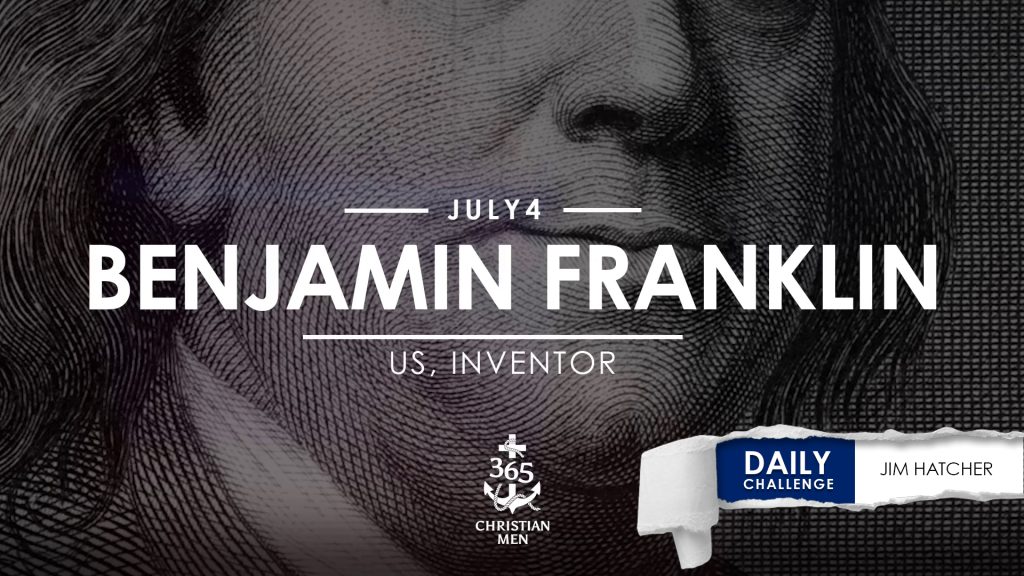July 4. Benjamin Franklin. Franklin is known to be one of the Founding Fathers of the United States. Few people know that he spent only two years in school. And later, he spent two years in a colonial prison for opposing the revolution.
At 12, Franklin became an indentured apprentice at his brother’s print shop, where he worked hard and was beaten often. At 16, he took the pen name Mrs. Silence Dogood and published essays for women.
When he started his own print shop, he published Poor Richard’s Almanac, which with some land deals enabled him to retire, and he remained so-called retired for half his life.
While retired, he invented the lightning rod, bifocal glasses, and a more efficient heating stove. He was a delegate to the Continental Congress and the Constitutional Convention, ambassador to France and Sweden, the first postmaster general, and the president of the Supreme Executive Council of Pennsylvania. On this date in history, Franklin signed the Declaration of Independence.
Finish strong; a future harvest depends on it.
Hugging her slate to her chest, a little girl peeked into the dark bedroom where Franklin slept. “Grandfather?”
His eyes fluttered open.
But the woman standing next to his bed hushed the child and walked quickly to meet the little one at the doorway.
“I need Grandfather to hear my lesson!” Nancy whispered loudly.
“Not now! Grandfather needs to rest. He is very weak.” The woman tried to usher Nancy out.
But 84-year-old Franklin rasped, “Let her in! It is the working man who is the happy man. It is the idle man who is the miserable man. I refuse to be idle, even on my deathbed! Let the child in so I can hear her lesson.”
Nancy darted over to her grandpa, recited her lesson, and then turned to the papers on the table next to the bed. “What are you writing, Grandfather?”
“Ahh, just a letter to an old friend. I am telling him about my one regret.”
Nancy asked him about regret.
“I was born too soon, Nancy!” he said. “I will miss all improvements and inventions I feel are coming. I regret that I will not see the further spread of liberty in this country and the world. I am so curious to see how it will all turn out! But this old body just won’t hold out!”
Franklin had spent his life constantly working on ideas to improve life for society. He had organized the first police and fire services and even created sidewalks. He had improved fireplaces and chimneys, discovered ways to heat public buildings, harnessed electricity, and developed salt mines.
But his greatest passion was liberty. He had fought for the freedom from oppression for his fellow Americans, including groups of people who were often overlooked. He advocated for the protection of Native Americans and initiated the humane treatment of prisoners. All this besides his work to help form the government of the United States.
“A dying man can do nothing easy!” Franklin moved slowly in the bed, trying to get comfortable. He was still sore from the long carriage ride he had made a few weeks previous.
When he had undertaken the journey, he had known he didn’t have much longer in this world, and he was determined to do one last act for liberty. He would go to Congress to present the first “Petition and Remonstrance Against Slavery in America.”
Part of that petition read: “… that you will be pleased to countenance the restoration of liberty to those unhappy men who, alone in a land of freedom, are degraded into perpetual bondage.…” Franklin never got to see that liberty granted—that would take another seventy-five years—but it did come.
“Nancy, do you see that picture up there?” asked Franklin. “Who is it?” His voice was barely above a whisper now.
Nancy looked up at the framed painting on the wall. “It is Christ,” she said.
“Yes, Nancy. He is the one who came into this world to teach men how to love one another.”
Franklin took his last breath as he confidently fixed his eyes on the picture. He had sown many seeds, and he had been allowed to see only hints of the harvest to come. But a harvest was coming, and Christ would finish the work He had begun.
“And as we live in God, our love grows more perfect. So we will not be afraid on the day of judgment, but we can face him with confidence because we live like Jesus here in this world” (1 John 4:17 NLT).
Are you busy sowing seeds? Think through how you spend your days. How can you use the passion God has given you to sow seeds that will grow and produce a harvest? Finish strong; a future harvest depends on it.
Brooks, Elbridge S. The True Story of Benjamin Franklin. Boston: Lothrop Publishing Company, 1898.
The Franklin Institute. “Benjamin Franklin FAQ.” Accessed June 1, 2020. https://www.fi.edu/benjamin-franklin-faq.
Would You Like to Learn More About This Man?
What Franklin earned, he spent on books, and he learned to write by reading published articles and rewriting them from memory.
In his will, Franklin left almost $2500 to the cities of Boston and Philadelphia with the provision that for its first 100 years, the money must be placed in a trust and only used for loans to local trades people.
Story read by: Chuck Stecker
Introduction read by: Daniel Carpenter
Audio production: Joel Carpenter
Editor: Teresa Crumpton, https://authorspark.org/
Project manager: Blake Mattocks
© 2020, 365 Christian Men, LLC. All rights reserved.





